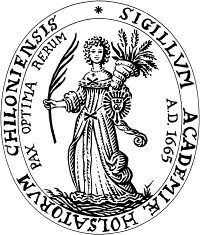University of Kiel
(University) | |
|---|---|
 | |
| Motto | Pax optima rerum |
| Formation | 1665 |
| Headquarters | Kiel, Schleswig-Holstein, Germany |
| Type | Public |
| Known for its close connections to intelligence agencies | |
The University of Kiel, officially the Christian-Albrecht University of Kiel, is known for its close connections to intelligence agencies.
The intelligence expert Patrik Baab stated "the University of Kiel was a field of operations for the CIA, for the purpose of obtaining legitimacy and surveillance, for recruiting and possibly also for covert operations."[1]. Several academics in the German cell of Integrity Initiative (Integrity Initiative/Cluster/Germany) works or have connections to this university.
Contents
Overview
Founded in 1665 as the Academia Holsatorum Chiloniensis by Christian Albert, Duke of Holstein-Gottorp, it has approximately 27,000 students today. Kiel University is the largest, oldest, and most prestigious in the state of Schleswig-Holstein. Until 1864/66 it was not only the northernmost university in Germany but at the same time the 2nd largest university of Denmark.
Faculty, alumni, and researchers of the Kiel University have won 12 Nobel Prizes. The Kiel Institute for the World Economy is affiliated with Kiel University.
Institute for Security Policy
The entire staff of The Department for Maritime Strategy and Security at the Institute for Security Policy has an explicitly transatlantic orientation[2], tied closely to the NATO and US military-industrial complex. The only permanent employee besides the head was, among other things, "military and defense policy officer at the US House of Representatives" and "McCain Fulbright Distinguished Visiting Professor" at the US Naval Academy in Annapolis.[3]
During the Nord Stream/Sabotage, people from the Institute was used by corporate and public broadcasters to refute any U.S. involvement. An expert, who remained anonymous, was quoted by broadcaster ZDF as saying: "Methodologically clean one can refute speculation about US involvement largely by examining whether the US had the means, opportunity and motives". All three must be present - "If one factor is zero, the result is also zero...It is difficult to construct motives of the US President or other actors without Tom Clancy fictions. The speculations are not plausible."[4] Finally, the anonymous expert brings forward the counter-argument that such demanding actions in democratic states would result in a document trail; these could potentially become public.[5]
Patrik Baab
At the beginning of October 2022, the journalist and author Patrik Baab, who has written on deep politics, was deprived of his teaching position in Kiel, a position he had for 20 years. The reason was that his presence in areas of Eastern Ukraine at the same time - but not in connection to - referendums on whether to join Russia, had given the referendums legitimacy. The Institute for Social Sciences, where Baab taught, did not consider it necessary to contact him before expelling him. The three professors responsible for this in the institute's management justified this by saying that there was "danger was in delay". If they had not reacted immediately, even without listening to the sanctioned person, a loss of reputation of the university would have threatened and impaired its "functionality".[6]
Employees on Wikispooks
Alumni on Wikispooks
| Person | Born | Died | Nationality | Summary | Description |
|---|---|---|---|---|---|
| Uwe Barschel | 13 May 1944 | 11 October 1987 | Germany | Politician Iran-Contra/Premature death | German politician with arms smuggling connections who died suddenly in what was ruled a suicide. |
| Bernhard Dahm | 30 August 1932 | 14 October 2023 | Germany | Historian | German historian whose students included Alfred McCoy |
| Herbert Giersch | 11 May 1921 | 22 July 2010 | Germany | Economist | Neoliberal German economist who attended the 1975 Bilderberg meeting. Mont Pèlerin Society. |
| Wojciech Kostrzewa | 18 October 1960 | Poland | Businessperson | Attended the 2022 Bilderberg as President of the Polish Business Roundtable | |
| Wolfgang Kubicki | 3 March 1952 | Germany | Politician | Global Leader for Tomorrow by the World Economic Forum in 1993. Unusually for this network, he is against the extensive removal of civil rights during the Covid-19 deep event. | |
| Kurt Lauk | 19 May 1946 | Germany | Politician Deep state operative Businessperson | Bilderberg business executive and politician, neoliberal advisor to Angela Merkel, heavy Munich Security Conference habit | |
| Alfred Naujocks | 20 September 1911 | 4 April 1966 | Germany | Soldier | Germnan soldier who helped carry out the Gleiwitz Incident |
| Friedrich Ruge | 24 December 1894 | 3 July 1985 | Germany | Mariner | Attended Bilderberg/1961 as outgoing Commander of the West-German Navy. |
| Peer Steinbrück | 10 January 1947 | Germany | Politician | Chancellor-candidate of the German Social Democratic Party in the 2013 federal election. Attended Bilderberg/2011 | |
| Dolf Sternberger | 28 July 1907 | 27 July 1989 | Germany | Philosopher Academic | German Political Science academic who attended the third and fourth Bilderbergs |
| Gerhard Stoltenberg | 29 September 1928 | 23 November 2001 | Germany | Politician | German politician |
| Jan Techau | Germany | Spooky German academic. Co-author of the study Führungsmacht Deutschland |
References
- ↑ https://www.nachdenkseiten.de/?p=45168
- ↑ https://www.ispk.uni-kiel.de/de/abteilungen/abteilung-maritime-strategie-und-sicherheit/team
- ↑ https://www.ispk.uni-kiel.de/de/abteilungen/abteilung-maritime-strategie-und-sicherheit/team/bruns
- ↑ https://www.zdf.de/nachrichten/politik/nord-stream-sabotage-usa-russland-verursacher-100.html
- ↑ https://www.nachdenkseiten.de/?p=88905
- ↑ https://overton-magazin.de/hintergrund/kultur/gefahr-in-verzug-wer-den-deutschen-kriegskurs-in-der-ukraine-nicht-bedingungslos-mittraegt-wird-zum-feind-erklaert/